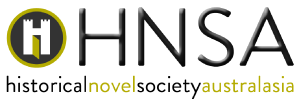What or who inspired you to first write?
I blush to admit, Enid Blyton. Well, she was about all that was available when I was a kid. I used to get a magazine of hers (Sunny Stories?) and there’d be a pic and message from her at Green Hedges, at her desk, with a dog or two hanging about. Looked pretty good to me.
What is the inspiration for your current book?
My daughter (also a writer, Allison Rushby) was doing some research for her current WIP and mentioned Mummy Unwrapping Parties in 1800s London. Who could resist? Lots of research, a residential in Britain and 65,000 words later, it’s about done. Next year, I have been awarded a Queensland Writers Fellowship to write a historical novel based on the experiences of young women who joined the Australian Womens Land Army in WW2. I’ve been interested in this topic for some time, and have done considerable research, so I’m very pleased to be given the time to write it.
Is there a particular theme you are exploring in this book?
The courage and resiliency of the girls. They took on this very tough physical work, previously regarded as ‘men’s work’ and they did it damn well.
Which period of history particularly inspires or interests you? Why?
Any period. Wherever there’s a good story. Lots are set in war time – this is not intentional, but war leads to ordinary people doing extraordinary things. I’ve written about ancient Egypt, the British Iron Age, WW1, WW2, Vietnam War, Shearers Strike ...
What resources do you use to research your book?
Libraries. Archives. The internet. Other books, fiction and non-fiction. Face-to-face interviews. Diaries. Letters. Documents. Travel overseas.
Which authors have influenced you?
Oh, so many ... Easier to say the ones I love. Jane Austen. Dodie Smith. Elizabeth Goudge. Karen Foxlee. Sheryl Gwyther. Antonia Forest. The Borrowers author.
Which methods/ strategies do you employ to write?
When an idea strikes, first I think about it. A lot. Eventually I develop a LONG outline (I’m a plotter, not a pantser.)Then eventually I get my backside on the chair and WRITE.
Is there anything unusual or even quirky that you would like to share about your writing?
Ooooh ... not really. Except I do a lot of thinking while swimming laps in the pool.
How long does it generally take you to write a book?
Years from the first idea to the finished ms if it’s a self-initiated project and I have no deadline. If it’s commissioned work, the deadline dictates.
What advice would you give an aspiring author?
Keep going. Just keep going. Everyone has to serve an apprenticeship. Everyone gets rejections. Everyone gets dud reviews. But if you really believe in what you’re doing, sooner or later you will come across that publisher, or editor, or agent, who Gets you. And you’ll live happily ever after. (No, you won’t. But it seemed a good way to end!)
London 1940. Bombs are falling. Ten-year-old Margaret Rose survives a deadly raid, but her home is destroyed. Her parents are gone. In faraway Townsville in Australia, her aunt and her family are ready to take Margaret Rose in, although eleven-year-old cousin Lizzie is not so sure.
But first there is a long and dangerous voyage to a strange country. Margaret Rose knows it’s not going to be easy. And Lizzie is not about to make it any easier.
HNSA 2017 Melbourne Conference
The HNSA 2017 Conference in Melbourne is being held on 8-10 September 2017 at Swinburne University, Hawthorn. Pamela Rushby will be appearing on the following panel in Session 1 on Sunday 10th September at 9-10 am.
How difficult can it be? Is Writing Children and Young Adult Fiction an easy option?
Writing historical fiction for children and young adults (CYA) takes skills that are often underrated. Gabrielle Wang, Wendy Orr, Pamela Rushby and Alan Tucker discuss with Felicity Pulman why CYA novels pose challenges not faced by authors of adult historical fiction.
Pamela will also be appearing in our HNSA Meet the Author satellite event on 9 April 2017 at the Mail Exchange Hotel, 688 Bourke St, Melbourne with Goldie Alexander, Robyn Bavati and Elizabeth Jane Corbett. Bookings are essential More details can be found on the HNSA website.
Early bird registration is open for the HNSA 2017 Conference. You will receive 15% off the full price for our weekend programme. The same discount also applies for tickets to our opening reception.
This celebration of the historical fiction genre will showcase over 60 speakers discussing our theme, inspiration, writing craft, research, publishing pathways and personal histories. Among the many acclaimed historical novelists participating are Kerry Greenwood, Kate Forsyth, Deborah Challinor, Lucy Treloar, Sophie Masson, Sulari Gentill, Robert Gott and Arnold Zable. The HNSA’s speakers’ list is available on the HNSA website.
In addition to the two stream weekend programme, there will be ten craft based super sessions and two research masterclasses. You won’t want to miss our interactive sessions on armour and historical costumes either! Manuscript assessments will be conducted by industry experts, Alison Arnold and Irina Dunn. And there are two calls for papers in our free extended academic programme.
Our First Pages Pitch Contest offers an opportunity for submissions to be read aloud to a panel of publishers. And we are delighted to announce the introduction of our inaugural HNSA Short Story Contest with a $500 prize!
Visit our website to take advantage of our early bird discounts while tickets are still available.
Let’s make a noise about historical fiction!







Love this interview, thanks!
ReplyDelete